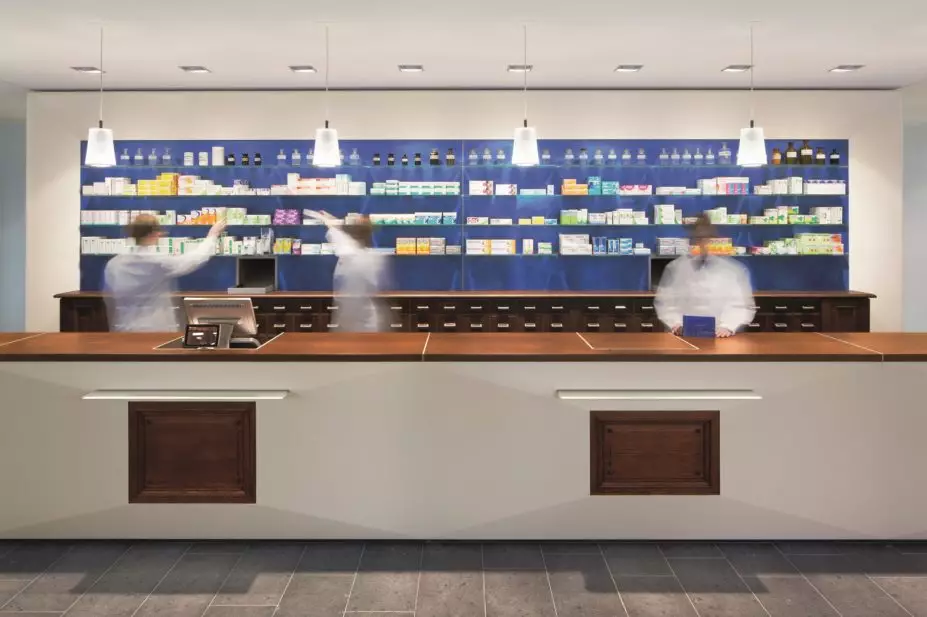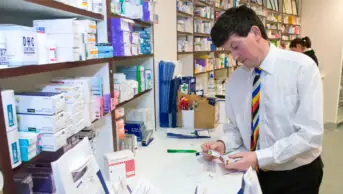
Blend Images / Alamy Stock Photo
In 2014, the Health and Social Care Information Centre reported that more than 1 billion prescription items were dispensed in community pharmacy in England alone[1]
. That is more than 1,900 items per minute. In the same year, 98.8 million items were dispensed in Scotland and 76.2 million items in Wales, with the highest cost attributed to diabetes medicines[2],[3]
.
Meanwhile, the demand for pharmacists’ clinical skills as medicines experts continues to grow. Medicines optimisation spans all pharmacy services whether they are delivered in community pharmacies, GP surgeries, nursing homes, hospitals, prisons, the military or primary care. In order to deliver this, maximising the skills, knowledge and experience of the rest of the pharmacy team is an absolute necessity.
As a pharmacist’s clinician role continues to evolve and become embedded in new areas, such as the recently announced employment of clinical pharmacists in GP surgeries, the other registered pharmacy professional within the pharmacy team – the pharmacy technician – can help to support them. When pharmacists engage in patient-facing roles to support those with long-term conditions, providing advice for those with complex and multiple medicine regimens or independently prescribing, the pharmacy technician is ideally placed to manage the ongoing supply of medicines after the pharmacist has clinically checked prescriptions.
Education and training
An important aspect of realigning functional tasks and providing confidence in delegating duties is to ensure there is a defined education and training pathway that assures the public and the profession of a competent practitioner at every level.
The current initial education standards set by the UK regulator the General Pharmaceutical Council (GPhC)[4]
for pharmacy technicians to enter the register outlines both the knowledge and competence required at level three on the Regulated Qualifications Framework (RQF), previously the Qualification and Credit Framework[5]
.
To understand what this means in terms of academic and performance capabilities, it is useful to look at the description against national measurements. Level three compares with A-level standard, along with autonomy and accountability ratings of taking responsibility for initiating and completing tasks and procedures, including responsibility for supervising and guiding others. It also indicates that the person should exercise autonomy and judgement within limited parameters. Application at this level requires the person to address problems that, although well defined, may be complex and non-routine. This requires appropriate investigation to inform one’s actions by selecting and using appropriate skills, methods and procedures. It also requires reflection to assess the effectiveness of chosen methods and actions.
To apply this to the initial qualifications undertaken by trainee pharmacy technicians, the national knowledge qualification RQF level three diploma in pharmaceutical science, is made up of 19 units of learning, spanning what is considered to be the pharmacy technician’s current scope of practice. The learning includes, at A-level standard, nine units of actions and uses of medicines across all the British National Formulary categories, four units of general science, including chemistry and human physiology, with the rest of the units focusing on legal pharmacy practice and preparation of medicines. In addition, the depth and breadth of this learning is applied to the learner’s everyday practice, where competence is assessed through the National Vocational Qualification process.
In comparison, level two — required by the GPhC for pharmacy assistants and dispensing assistants — relates to completing routine tasks and addressing straightforward problems, exercising autonomy and judgement subject to overall direction and guidance.
Level two competence is achieved through more diverse routes, as detailed in the GPhC policy on minimum training requirements for dispensing/pharmacy assistants and medicines counter assistants[6]
. The guidance in the policy shifts the requirement to ensure that pharmacy assistants, as non-registrants but staff who are delivering services connected with those provided by registrants, are trained and competent.
Expanding roles
Pharmacy technicians, as registered and accountable professionals working across the same pharmacy environments as pharmacists, can be used to release pharmacists’ time to undertake additional clinical responsibilities. Job roles and responsibilities already in practice include those at operational, specialist and managerial level. Utilisation of pharmacy technicians’ skills, knowledge and expertise is therefore varied.
In hospital pharmacy, technicians are involved in a wider range of roles than in the community. For example, pharmacists have delegated tasks on the wards to competent staff, such as medicines reconciliation (creating the most accurate list possible of all medicines a patient is taking) and advising patients on how to take their medicines while in hospital or upon discharge. Some hospital pharmacy technicians are in charge of ordering repeat supplies of medicines for the patient’s hospital stay. Some technicians are responsible for the procurement of medicines stock, the operational management of the day-to-day running of the dispensary, managing clinical trials, writing standard operating procedures, and working in medicines information and clinical governance roles.
In primary care and community services across the UK, pharmacy technicians are supporting pharmacists as prescribing support pharmacy technicians, medicines optimisation project managers and, in Scotland and England, some are undertaking domiciliary visits to look at medicines waste through poor adherence.
Although, comparatively, the role of the pharmacy technician in the community is not as advanced as in the hospital setting, new roles are beginning to emerge. This is of upmost importance if the aspiration of pharmacy fulfilling an integrated clinical role is to be realised. One role that has crossed over from hospital pharmacy is that of an accuracy checking pharmacy technician.
Blurred roles
The expanding responsibilities of pharmacy technicians may help give clarity to the role (e.g. specialised pharmacy technicians have specific duties to fulfil). However, there is no clear distinction between a newly registered pharmacy technician and a dispensing assistant. The response to the GPhC’s ‘Tomorrow’s pharmacy team’ discussion paper[7]
indicates that the profession “requires greater clarity around the role of the dispensing assistant, where differences between dispensing assistant and pharmacy technician roles become blurred”. This must be resolved if pharmacy technicians are to further their practice and help release pharmacists to conduct more clinical work.
To support the development of pharmacy technician foundation practice, the Association of Pharmacy Technicians UK (APTUK) has launched a Foundation Pharmacy Framework[8]
. Using the overarching foundation framework developed as an outcome of Modernising Pharmacy Careers — a programme designed to ensure the pharmacy workforce has the knowledge, skills and capacity to deliver the services of the future for patients and the public — APTUK has contextualised this in line with pharmacy technician practice. It supports the identification of an individual’s learning gaps and focuses on the development of professional skills, knowledge and behaviours. Trained APTUK foundation champions coach and mentor pharmacy technician members, providing support for their development and career choices.
Referring to the address by England’s chief pharmaceutical officer, Keith Ridge, at the Royal Pharmaceutical Society’s (RPS) annual conference in September 2015[9]
, clinical pharmacy will expand to help address inefficiencies in the system, such as reducing medicines waste and overuse, increasing medicines adherence and preventing medicines-related hospital admissions.
Alongside medicines optimisation sits the wider focus of public health and well-being, preventing ill health and supporting self care. Through the suite of advanced and enhanced pharmacy services that pharmacies can offer, pharmacy support staff and pharmacy technicians are professional advocates for public health. The development of support staff and using their skills will make a positive impact in pharmacies’ healthy living agenda.
As highlighted in the GPhC’s ‘Tomorrow’s pharmacy team’ discussion paper responses, many pharmacy technicians will be working with new technology and processes. They are effectively positioned within the team to support many of the services outlined in NHS England’s ‘Quick guide: extending the role of community pharmacy in urgent care’[10]
, such as repeat dispensing, supporting people with long-term conditions to get the most benefit from their medicines, and helping people understand new medicines and changes to medicines, especially on discharge from hospital. For example, pharmacy technicians could be advising patients on the use of chronic obstructive pulmonary disease rescue packs and providing inhaler use counselling.
Working together
Maureen Baker, the chairman of the Royal College of General Practitioners, believes the £15m scheme to give patients pharmacist support in GP surgeries[11]
is a postive move. “[Pharmacists] will not be substitutes for GPs, but will work closely with us as part of the practice team to resolve day-to-day medicine issues, particularly for patients with long-term conditions who are taking a number of different medications,” she says. “This has the potential to have a major impact on patient care and safety, as well as reducing waiting times for GP appointments.”
The same could be said about pharmacy technicians, pharmacists and the pharmacy team. Pharmacy technicians will not be substitutes for pharmacists but, as foundation practitioners, they can work closely together, exercising autonomy and judgement within limited parameters, together with supervising and training other staff, to carry out day-to-day medicines sale, supply, assembly and preparation activities. Working together for the benefit of patients will allow pharmacy to embrace the changes that are needed to relieve pressure on the UK healthcare system.
Tess Fenn is president of the Association of Pharmacy Technicians UK.
References
[1] The Health and Social Care Information Centre. Prescriptions dispensed in the community, statistics for England – 2004–2014. July 2015.
[2] ISD Scotland. Community pharmacy: prescription cost analysis. December 2015.
[3] Welsh government. Prescriptions dispensed in community in Wales. March 2015.
[4] General Pharmaceutical Council. Standards for the initial education and training of pharmacy technicians. September 2010.
[5] The Office of Qualification and Examinations Regulation. Regulatory requirements for Qualification and Credit Framework. August 2008.
[6] General Pharmaceutical Council. Support staff: minimum training requirement: policy on minimum training requirements for dispensing /pharmacy assistants and medicines counter assistants. September 2011.
[7] General Pharmaceutical Council. Tomorrow’s pharmacy team: responses to the discussion paper. November 2015.
[8] Association of Pharmacy Technicians UK. Foundation Pharmacy Framework. Available at: http://www.aptuk.org/about-us/education/foundation-pharmacy-frameworkfpf/
[9] NHS England. Role of pharmacists is set to grow and grow – Dr Keith Ridge. 15 September 2015.
[10] NHS England. Quick guide: extending the role of community pharmacy in urgent care. November 2015.
[11] NHS England. New £15m scheme to give patients pharmacist support in GP surgeries. 7 July 2015.


